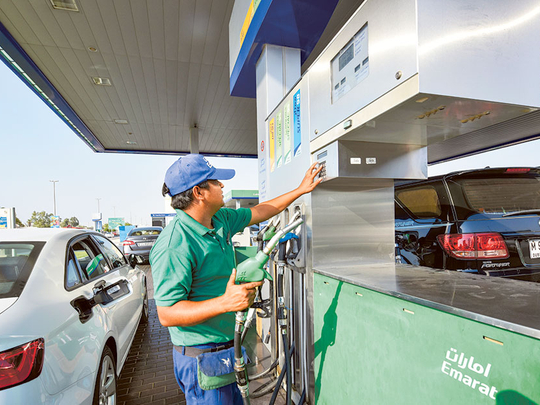
Abu Dhabi: The UAE Ministry of Energy will announce new fuel prices for the month of September on Thursday.
In a tweet, Dr Matar Al Neyadi, Undersecretary of the Ministry of Energy and Chairman of the Fuel Price Committee, said the fuel prices are likely to be lower for the month of September than the previous month.
The fuel price committee will take into account average international prices in deciding the fuel prices for the following month.
The committee will be chaired by the Undersecretary of the Ministry of the Energy. Other members include Undersecretary of the Ministry of Finance, CEO of Adnoc Distribution, and CEO of Emirates National Oil Company (Enoc).
The Ministry had increased petrol prices by about 24 per cent and reduced diesel prices by 29 per cent in a landmark decision taken last month to support the national economy, lower fuel consumption, protect the environment and preserve national resources.
The new fuel prices will be announced as oil prices tumble across the globe. From a peak of $115 (Dh422.39) in June last year, oil prices reduced to less than $45 this week.
According to credit ratings agency Fitch, pre-tax energy subsidies in the UAE will amount to $12.64 billion, or 2.87 per cent of GDP, in 2015.
The figure is 4.62 per cent of GDP for Saudi Arabia and Bahrain, and for Kuwait and Qatar it is 1.81 per cent and 1.64 per cent respectively.
Fitch said the successful implementation in the UAE while oil prices are low could increase public acceptance of subsidy reform elsewhere in the region, boosting the prospects for reform.
Gary Dugan, Chief Investment Officer at the National Bank of Abu Dhabi said the deregulation of fuel prices is a long term positive that helps to reduce government expenditures at a time when income is down significantly due to the fall in oil prices.
“I think other countries such as Saudi will have to follow the example of the UAE given that the gap between government revenues and income is forecast by the IMF to be close to 20 per cent of GDP,” he told Gulf News.
“Given the fall in the spot price of crude oil the assumption will be that the fuel price should fall.”
In January, Kuwait raised domestic diesel and kerosene prices but retracted the decision later due to criticism from parliament members. Oman has been studying gasoline prices while Bahrain has increased the price of natural gas for the industry.












